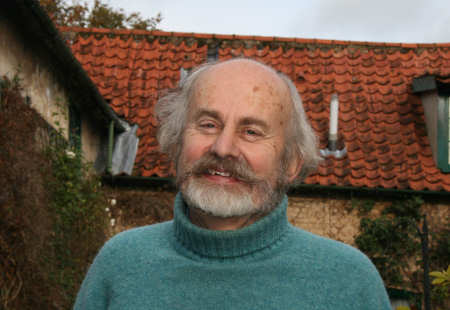 Norfolk magistrate and Quaker John Myhill looks at nineteenth century German philosophy to see where seeds were sown for world war.
Norfolk magistrate and Quaker John Myhill looks at nineteenth century German philosophy to see where seeds were sown for world war.
As Quakers we seek for the origins of war within ourselves. What unpalatable truths about ourselves are we hiding? Are our ideas mistaken? In applying this same magnifying lens to German Theology, I am certainly NOT saying that these writers were responsible for the war. I am not interested in apportioning blame for that huge human tragedy. But ideas of German theology are still alive today, and wars continue, so we may all benefit from a little introspection.
German theology was really the only kind in the nineteenth century. Their university system and Lutheran commitment, meant that their theology dominated the thinking in Universities everywhere. Their ideas filtered down to both sides in the time leading up to 1914.
Johann Fichte (1762-1814) proposed absolute Idealism. He sought the same happiness as the Jacobins in the French Revolution, whom he felt had been betrayed by Napoleon. The Jacobins were the pinnacle of French culture, and he felt that their philosophy could make Germany the pinnacle of culture in the future.
Friedrich Schleiermacher (1768-1834) believed that Christ taught absolute dependency upon God. Sadly this view, which I wholly accept as correct; led to a culture of obedience to State Authority, which was essential for the production of the 1914 war.
The consciousness of Jesus was saturated by awareness of God. By God he meant the world, the all, the universe. This view of God meant that MAN rather than God was to become the starting point of theology. This in turn made possible the views of
Schopenhauer and
Feuerbach.
George Willhelm Hegel (1770-1831) was a hugely influential philosopher whose ideas were used by Marx and the Existentialists; but much of his writing supports Prussian militarism. The “Rational State” described in his “Philosophy of Right” is very similar to the Prussia of his day. God is reduced to humanism. Authority is given to the state by its citizens, because Germans like to obey orders and know their place in a hierarchy. This stereotype of the German people has not gone away.
Friedrich Schelling (1775-1854) in contrast was opposed to the State, as he felt it treated free men as if they were merely cogs in a machine. But in later life he moved away from Idealism to positivism and was conservatively opposed to the revolution of 1848.
Arthur Schopenhauer (1788-1860) defined four kinds of Reason, of which the fourth was Will or motivation. He took a rather Buddhist view of this, suggesting that our desires would carry us down to a senseless vortex. He held that Will was driven by desire, and could only be escaped by Art. The emphasis on Will provided an opening for Nietzshe, and 1914 was certainly driven by the Will to Power. Schopenhauer was also extremely sexist (woman was made for man’s use as indicated by her shape!) and the cult of macho values certainly contributes to war.
Ferdinand Bauer (1792-1860) was interested in why Jesus appeared at that particular point in history, and how Paul edited the Gospel texts after they were written. It was this detailed scholarship that produced the dominance of German theology, which gave a huge sense of National pride. Nation and God were one.
Johann Dollinger (1799-1890) was a Roman Catholic theologian opposed to papal infallibility (proposed by Pius iX at the first Vatican Council). He was excommunicated for the last 20years of his life. He had travelled a long way from his 1851 biased account against Luther; to become part of a German Christianity.
Ludwig Feuerbach (1804-72) Took the writings of Hegel and Schleiermacher to mean that there is no transcendent, external other God – no supernatural God of the Bible. Instead everything that previous writers have said about the great spirit in everything, should be said about MAN. He has been called the first Humanist, wishing to project on to man all that had previously been said about God. Clearly it is a short step from this to Nietzsche’s “Superman”
David Friedrich Strauss (1808-74) attempts to rescue Christianity from any suggestion that it depends on supernatural miracles which have been disproved by Science. Following Hegel’s Idealism, he sought to raise the ideas above facts.
What is important is the meaning behind the stories in the Bible. When we understand the meaning, we enter the self-consciousness of the human spirit. Again this emphasis on the learning of the superior mind (super man) contributes to the need for obedience by the ordinary people, and takes us away from the simplicity of the message of Jesus, about loving our enemies, and meeting the needs of the poor.
Albrecht Rilschel (1822-89) said that the “Justified Christian” should work for the common good, wherever he has been placed by divine providence. Unfortunately this could be taken to mean dying for ones country. He is credited with eh great achievement of bringing together the previous conflict between Faith and Works. Christ he said is there for each individual. This can provide solace for those dying on the battlefield.
Friedrich Nietzsche (1844-1900) cared passionately about animal cruelty. The collapse of his health occurred when he attempted to rescue a horse that was being cruelly treated. But his idea of the superman and his opposition to Christianity were clearly part of German patriotism in 1914, and did not have to wait for Hitler to make them part of his platform in 1933. Ideas taken out of context are dangerous things, and Nietzsche is no more to blame than any of the other thinkers of his time.
Adolf Harnack (1851-1930) aimed to reveal the hidden centre of Christianity by removing the additions of history. He emphasised the Fatherhood of God which values each soul infinitely. Sadly this can easily become the Fatherhood of the Fatherland. He was a liberal Protestant, teaching ethical monotheism, and would have been horrified by any use of his ideas to support war.
Ernst Troeltsche (1865-1923) brought many of these ideas together. Christ is not unique, but must be seen in the context of history, religion, culture and ideas. Miracles are just a way of describing ideas. There are no absolutes. Man has an affinity with the holy, and will describe his experience according to his culture and upbringing. He was tolerant of other religions and had no sense of being a missionary for the Lutheran “sect”. Was his relativism a step towards rejecting Jesus claim of pacifism as an absolute value? Does tolerance enable men to accept War as all right?
These great German intellectuals, taught many other wise insights. Much that they wrote is still worthy of study. I have concentrated, unfairly, on some of the things they said, which could have assisted the movement towards war that began long before 1914. I may be mistaken in my analysis or conclusions. But the question we need to ask is what seeds of war are being sown by the popular theories of reality and truth NOW. These will include scientism, free market materialism, and atheism, as well as the more obvious forms of fundamentalism. Academic theologians today do not have the huge impact on society that German theology did in the Nineteenth century; but the same ideas are still around, expressed in new ways through those who dominate our media.
 John Myhill is a Norwich Quaker and magistrate.
The views carried here are those of the author, not of Network Norwich and Norfolk, and are intended to stimulate constructive debate between website users.
John Myhill is a Norwich Quaker and magistrate.
The views carried here are those of the author, not of Network Norwich and Norfolk, and are intended to stimulate constructive debate between website users.
We welcome your thoughts and comments, posted below, upon the ideas expressed here.
Click here to read our forum and comment posting guidelines.